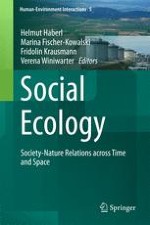
2016 | OriginalPaper | Buchkapitel
1. The Archipelago of Social Ecology and the Island of the Vienna School
verfasst von : Marina Fischer-Kowalski, Helga Weisz
Erschienen in: Social Ecology
Aktivieren Sie unsere intelligente Suche, um passende Fachinhalte oder Patente zu finden.
Wählen Sie Textabschnitte aus um mit Künstlicher Intelligenz passenden Patente zu finden. powered by
Markieren Sie Textabschnitte, um KI-gestützt weitere passende Inhalte zu finden. powered by